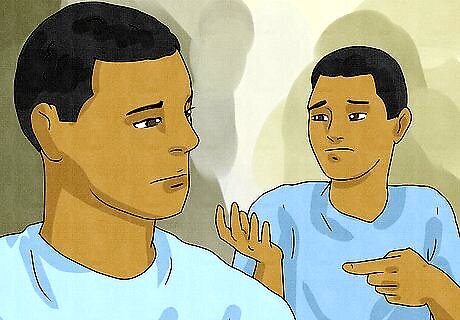
views
- Dating a narcissist may cause lowered self-esteem, a loss of identity, insecurity in your relationship, isolation, self-doubt, or anxiety.
- Not all consequences of dating a narcissist are bad—survivors of narcissistic abuse experience increased compassion for others and self-respect.
- Set firm boundaries, reconnect with loved ones, and seek professional mental health help to recover your self-esteem and heal from a narcissistic partner.
You may have lowered self-esteem or confidence.

Narcissistic partners act like they’re always right and you’re wrong. This might’ve made you angry and defensive at first, but now you may have internalized a negative self-image. The put downs wear your self-esteem down, and you may think you’re less deserving or valid than others. You may feel ashamed over your quirks, likes and dislikes, or future plans. As your confidence dims, you might start hiding these traits to avoid feeling shame. One of the defining features of narcissism is the treatment of other people as less important, competent, valuable, skilled, or special. Narcissists secretly suffer from abysmal self-esteem themselves. They tear down others any way they can to make themselves feel better.
You might feel isolated.

Narcissists typically isolate their partners slowly and methodically. They’ll bad-mouth others or make arguments that someone isn’t really your friend to make you doubt your other relationships. You might feel alone except for your partner, and you may notice an abundance of severed ties when you reflect on your friends and family. Narcissists try extra hard to block people who are “onto them” out of your life. Many narcissists use "triangulation." They'll constantly compare you to another person or start a rumor to cause tension in your relationships. On the positive side, this isolation can inspire you to put new effort into making new connections and getting more fulfillment out of your current relationships.
You may have lost your identity.

When your self-esteem erodes, you may become codependent. You might seek the narcissist’s validation and permission to do things constantly, and your assertiveness may be diminished. As your boundaries fade, your life and personality might become completely mixed with theirs. You might put your own freedom, identity, and self-expression to the side in order to please and get affection from your narcissistic partner. The loss of confidence in who you are might make it harder to leave your partner, leaving the narcissist in control of the relationship dynamics. Take advantage of support groups like Codependents Anonymous (CoDA) to regain your independence.
You might walk on eggshells to avoid arguments.

The slightest criticism or disagreement can trigger a narcissist’s rage. They view any negative comment as an attack, so you might stop resisting their delusions and tread softly to avoid being called names, blamed, or ignored. It may feel easier to disregard their problematic behavior than confront them. Confront the narcissist calmly and respectfully. Focus on your feelings rather than their motivations or reasons. Stay calm during confrontations, even if they respond with anger or defensiveness. Walk away and revisit the discussion later instead of escalating. Seek shelter immediately if you feel physically threatened by your narcissistic partner. Physical abuse typically repeats itself.
You may prioritize your partner’s needs over yours.

Narcissists feel entitled to special treatment from their partners. They think you’re less valuable or selfish when you don’t comply with their every wish or ask them for something. Over time, you might learn to give in to the narcissist’s needs to avoid aggression, the silent treatment, or narcissistic rage. Narcissists don’t understand that you have your own needs. Eventually, you might stop advocating for yourself just to keep the peace. Dating a narcissist can be draining. Prioritize self-care and your wellbeing to protect yourself and stabilize your relationship.
You might feel used.

Narcissists view people as objects to serve them. You may feel like you aren’t viewed as an equal partner. Your standing with the narcissist depends on what you do for them, who your connections are, and how you make them look. You might feel like a tool they use to maintain their self-image. Narcissists can’t empathize and don’t hesitate to take advantage of other people to get what they want. Some narcissists exploit their close ones intentionally, while others are oblivious to their manipulative behavior.
You may struggle to say “no.”

You may be used to pouring all your time and energy into your partner. Maybe now you’re always busy doing things, but it’s mostly for other people. It might be hard for you to say “no” when you’re asked to join a committee or organize a group, and you may struggle to set and maintain boundaries to protect yourself. The bright side is that you might’ve developed a strong work ethic, and you can accomplish great things for yourself once you stop serving others first. Set self-care boundaries with others and stick to them. Even narcissists will recognize you won't budge on certain issues if you consistently say no.
You could feel insecure in your relationship.

Many narcissists intentionally make you jealous to control you. They might praise an ex or flirt with someone right in front of you to raise their self-esteem and make you work harder for their affection. You might ruminate on the earlier, happy days of your relationship and and try to get those back. As their tactics wear on you, you might obsess over making them love you more. You might become “clingy” (which is what they want from you).
You may blame yourself for everything.

A narcissist blames their partner for anything that doesn’t go their way. Over time, this feeling of blame can become your default position whether you’re at work or out with friends. You may feel that you’re responsible for what’s happening all the time, even when it has nothing to do with you. Others may start expecting you to find solutions to problems if you consistently adopt a “this is my fault” mindset. Recognize that it isn’t always your responsibility to fix every problem. If a situation doesn’t involve you, you’re not obligated to get involved.
You might doubt yourself constantly.

Narcissists gaslight to make people second-guess themselves. Gaslighting is a form of manipulation to make someone question their own sanity or reality. Narcissists do it gradually over long periods, so it’s hard to notice. The more they gaslight you, the more you might start to believe them. Eventually you may think they’re right, and your self-esteem and mental health might sink. Common gaslighting phrases include: “I did it because I love you” or “No one else will do things for you like I have.” “You’re too sensitive.” “You never told me about that” or “You’re imagining things.” Reconnect with trusted friends and family to recover from gaslighting and regain your self-trust.
You could spend all your money on your partner.

Financial abuse is an often overlooked way narcissists control people. They might constantly expect lavish, name-brand gifts and fine dining from you while rarely spending a cent in return. Some even bully their partners into opening credit cards or taking out loans for expensive purchases. Their lack of empathy means your narcissistic partner doesn’t consider your financial well-being. All they want is for you to spend money on them. Evaluate your spending habits when you’re on dates or shopping for your partner. Dramatically unbalanced spending is a red flag of abuse.
You might view kindness as transactional.

Narcissists only show kindness so you'll do something for them. Even if you’re no longer with your partner, you may still think that kindness needs to be repaid with favors, money, or even sex. You might lose trust that people can be genuinely kind, or feel anxious whenever you’re on the receiving end. Being deprived of kindness can make you crave it in any form, which might lead you to enter more manipulative relationships in the future.
You could feel mentally or physically unwell more often.

Prolonged stress and abuse has physical and mental consequences. You may feel anxious or depressed because your social circle shrunk and your self-esteem dropped. You may also feel sick, get headaches, have chronic pain, or experience GI issues more frequently. Toxic levels of bullying and criticism can also lead to severe conditions like eating disorders and post-traumatic stress disorder (PTSD). If any of these conditions is affecting your ability to work or take care of yourself, seek out a mental health professional to begin healing from your abuse.
You might improve at spotting “red flags.”

Your experience dating a narcissist may have heightened your instincts. You might be able to detect signs of narcissism in others now that you’ve seen it up close. This serves to protect you as you enter future relationships, and may inspire you to reach out to others suffering from narcissistic abuse. It’s easy to overlook red flags when you’re infatuated. However, you may now know that not everyone is capable of loving and fulfilling relationships.
You could become more compassionate.

After a lack of empathy, you might treat others with deep kindness. You may experience heightened compassion for suffering people and animals, or have a renewed moral stance on what’s right or wrong. You realize that genuine kindness is special and should be celebrated. You may also have a newfound respect for people who are kind, gentle, and compassionate themselves.
You might draw firmer personal boundaries.

You may now value your own wellbeing more than before. Many who used to date narcissists insist on “zero tolerance” policies when it comes to other people’s bad behavior. Sticking to boundaries is new territory, but it’s a sign that you’re recovering your personal power. The clearer and more consistent you are about what you will or won’t do, the harder it becomes for other people to control or manipulate you. Narcissists usually try to keep control over their partners, even if they’ve left. Go “no contact” with them to sever ties and maintain your boundaries.
You could gain renewed self-respect.

You might gain renewed self-trust and love after your relationship. Your experience with emotional abuse could make you appreciative of your intact emotional abilities, and you’re getting reacquainted with your old hopes and dreams. You might prioritize self-care more and view yourself as worthy of love. The journey to healing is nonlinear and personal. Some experience new growth and perspective while they’re in the relationship, while others need a separation.



















Comments
0 comment